元宵节古诗词《青玉案·元夕》英文翻译
水调歌头 英语翻译
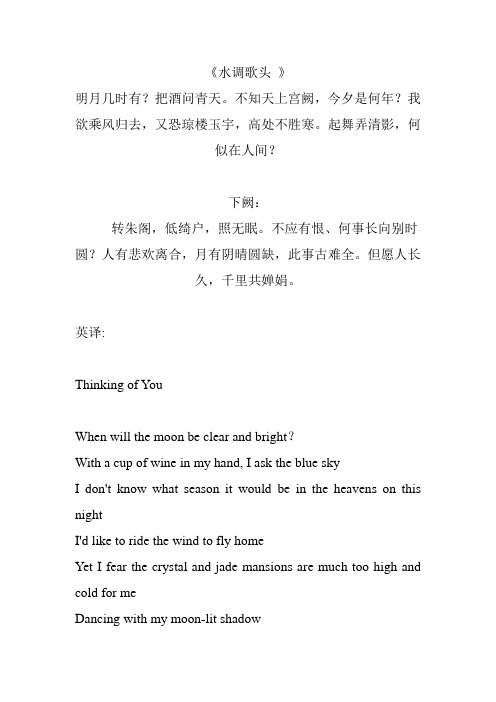
《水调歌头》明月几时有?把酒问青天。
不知天上宫阙,今夕是何年?我欲乘风归去,又恐琼楼玉宇,高处不胜寒。
起舞弄清影,何似在人间?下阙:转朱阁,低绮户,照无眠。
不应有恨、何事长向别时圆?人有悲欢离合,月有阴晴圆缺,此事古难全。
但愿人长久,千里共婵娟。
英译:Thinking of YouWhen will the moon be clear and bright?With a cup of wine in my hand, I ask the blue skyI don't know what season it would be in the heavens on this nightI'd like to ride the wind to fly homeYet I fear the crystal and jade mansions are much too high and cold for meDancing with my moon-lit shadowIt does not seem like the human worldThe moon rounds the red mansionStoops to silk-pad doorsShines upon the sleeplessBearing no grudgeWhy does the moon tend to be full when people are apart?People may have sorrow or joy, be near or far apartThe moon may be dim or bright, wax or waneThis has been going on since the beginning of timeMay we all be blessed with longevityThough far apart, we are still able to share the beauty of the moon togetherPoem written during the night of the Mid-Autumn Festival of 1076 by Su Tung Po (Translated by Shun-Yi Lee in 1998)1. A thousand miles apart and wishing upon the same gentlemoon that everyone lives long and well.2. 1. Though miles apart, could men but live forever dreamingthey shared this moonlight endlessly.3.Wish us a long life so as to share the beauty of this gracefulmoonlight, even thousands miles apart4.May lovers, even though miles apart, live long to share thebeautiful light of this full moon .1、但愿人长久,千里共婵娟。
这些古诗的英文翻译太美了

这些古诗的英文翻译太美了汉语博大精深古言、古诗更是奥妙无穷一句古诗蕴含的意思有很多如果要翻译成白话可能要很多文字翻译成英语难度更大一起看看翻译大家许渊冲是如何用精简的单词翻译这些朗朗上口的古诗的吧!▼静夜思李白床前明月光,疑是地上霜。
举头望明月,低头思故乡。
Before my bed a pool of light,I wonder if it's frost aground.Looking up, I find the moon bright,Bowing,in homesickness I'm drowned.登幽州台歌陈子昂前不见古人,后不见来者。
念天地之悠悠,独怆然而泪下。
Where the sages of the past,And those of future years?Sky and earth forever last,Lonely,I shed sad tears.天净沙·秋思马致远枯藤老树昏鸦,小桥流水人家。
古道西风瘦马,夕阳西下,断肠人在天涯。
Over old trees wreathed with rotten vines fly evening crows;Under a small bridge near a cottage a stream flows;One ancient road in the west wind a lean horse goes.Westward declines the sun;Far,far from home is the heartbroken one.寻隐者不遇贾岛松下问童子,言师采药去。
只在此山中,云深不知处。
I ask your lad neath a pine-tree,“My master’s gone for herbs,” says he.You hide amid the mountains proud,I know not where deep in the cloud.江雪柳宗元千山鸟飞绝,万径人踪灭。
【双语】辛弃疾·《青玉案·元夕》

【双语】辛弃疾·《青玉案·元夕》青玉案元夕辛弃疾东风夜放花千树,更吹落、星如雨。
宝马雕车香满路。
凤箫声动,玉壶光转,一夜鱼龙舞。
蛾儿雪柳黄金缕,笑语盈盈暗香去。
众里寻他千百度,蓦然回首,那人却在、灯火阑珊处。
Qingyu’anThe Lantern FestivalXin QijiLanterns look like thousands of flowers aglow; Later like stars, from the skies, fallen below. On main streets, horses and carriages ply. There, ladies shed perfume, as they pass by.Orchestral music and song greet our ears,As the moon, slow and steady, eastward veers.Of the Spring Festival, this night marks the end.The whole night, capering, carps and dragons spend.Adorned with ribbons or paper flowers on their head,Clad in their best raiment, something bright or red, Women squeeze their way among the festive crowd,As they talk and laugh; even giggle around.Roughed and powdered; perfumed to their hearts’ content, They cannot but leave behind a subtle scent.Up and down the main streets, I must have run –A thousand times or more in quest of none,Who, I have concluded, cannot be found;For, everywhere, no trace of her can be seen,When, all of a sudden, I turn around,That’s her, where lanterns are few and far between.(徐忠杰译)Green Jade CupLantern FestivalXin Qi-jiOne night’s east wind adorns a thousand trees with flowers And blows down stars in showers.Fine steeds and carved cabs spread fragrance en route; Music vibrates from the flute;The moon sheds its full light,While fish and dragon lanterns dance all night.In gold-thread dress, with moth or willow ornaments,Giggling, they melt into the throng with trails of scents.But in the crowd once and againI look for her in vain.When all at once I turn my head,I find her there where lantern light is dimly shed.(许渊冲译)The First Full-moon FestivalXin QijiThe spring wind brings hundreds of trees in flower at night, And also blows down numerous stars like rain.Noble horses and carved coaches strew the path with perfume.The phoenix-organ rings loud,The crystal-pot lantern moves around,The dances of fish-and-dragons go on all night long.Decked with jade-moths, silver-willows and gold threads.Talking and laughing, the fair ones pass along in the dark.A thousand times I’ve been seeking him among the crowds.When I turn round, there he is amid the declining lantern fair.(初大告译)Qing Yu AnThe Lantern FestivalXin QijiIn the east wind tonight a thousand trees burst into bloom And stars are blown down like rain;The whole perfumed road is throngedWith fine carriages and horses bright with gems; Phoenix flutes make music,The moon light flashes,Fish and dragon lanterns whirl the whole night long.Golden willow and butterfly trinkets in her hair, Laughing and chatting she leaves a faint fragrance behind.A thousand times I search for her in the crowdAnd, suddenly turning my head,Discover her where the lantern lights are dim.(杨宪益、戴乃迭译)To the Tune of Qingyu’an:on the night of the First Full Moon Xin QijiEast winds blow.Lanterns glowLike thousands of trees blossoming, Like thousands of stars failing. Gay-hung horses,Heavy carriages,Back and forth,Carrying lovely ladies,And their sweet scentAll along the road.Phoenix flutes pipe,Jade lanterns glitter,Dances and songs all around, Throughout the night.They’re everywhere,With their gilt willow strings,Their moth-shaped pins, Giggling, chattering,Their scent sneaking.But where is she?I search the crowdOver and over:Nowhere.And then, I turn round,Suddenly, there, in a quiet place,There she is.(丁祖鑫译)The Lantern Festival Night(To the Tune Green Jade Table)Xin QijiTh’ east wind at night has flowered a thousand trees, Bringing showers of glowing stars down streets, Fleeting our scented chariots and stately steeds. Phoenix-cooing flutes resounding,Jade-pot-flashing lanterns revolving,Dolphins and dragons are dancing away –All night long it’s bright as day.See the grain moths silvern, the tassels golden?See the snow-clad willow twigs of the maidens Passing with laughter gurgling, fragrance floating?Far and near, among the crowds e’er surgingTens of thousands of rounds for one I’ve been searching; Only on a glance cast backward do I behold:There she is, where lights are burning so low!(刘国善、王治江、徐树娟等译)Qing Yu AnXin QijiAt night the east wind blew open a thousand flowering trees. It blew down stars,Falling like rain.Sleek horses and carved coaches lined the roads,Sounds of the melodious vertical flute wafted in the air. The bright orb shed its light, revolving;A night of fish and dragons dancing.Wearing exquisite ornaments and gold-laced willow twigs, The ladies’ giggles and whispersLeft a trail of dark fragrance.Looking for that man in the crowds a thousand times –Turning suddenly,She saw the man standing where the lights were low.(龚景浩译)Qingyu’anThe Lantern FestivalXin QijiAt night the wind blows open thousands of flowers,And sends down from the skyA rain of stars for many hours.Horses sand carved carriages speed by,Giving off sweet scents all along.The flute strikes up a merry tune,In all brilliance moves the moon,Fish and dragon lanterns dance all night long.Their heads with gold trinkets on,Giggling, sweet ladies are come and gone.I’ve looked for her again and againIn crowds, but all in vain.Turning back my face,In a quiet, dimly-lit place,I sight the embodiment of grace.(陈君朴、冯修文译)Qing Yu AnEve of the Lantern FestivalXin QijiA night of east wind sprouted blossoms on a thousand trees, Blowing offSparks like rain.Decorated horses, sculpted coachesAnd fragrance filled the streets to satiety.Panpipes moved the crowdsAs jade kettle-shaped lamps turned,And fish-dragon dance the whole night through.Moth hairpins, snowy willows and gold filigrees Giggling and chattering away, a feint scent trailing.In the crowd, I looked for her a thousand times; Around I turned,And there she was,Where the light was low and dim.(任治稷、余正译)Key: Ch’ing Yü AnHsin Ch’i-chiThe east wind tonight sent a thousand trees to bloom, And also blew down a shower of meteors.The streets are fragrant as ladies roam,And jamming the roads are horses and dainty chariots.A lady, supple, pale, only willow and snow may compare, Sporting a hair pin with a tassel of gold hanging down, Laughed, talked and with her perfume, disappeared.I searched for her from the crowd a thousand times, And, as I turned my head, suddenly,There she is! At last I find –She’s standing there where the lights are dimly lit.(王季文译)The Desk of Green JadeThe Lantern FestivalXin QijiAs if th’ east w ind sent down a thousand trees in bloom, Which soon fall like hosts of shooting stars in full glare, Fireworks of all sorts crack and boom.With trails of scent, steeds and carv’d carriages along tear. Soul-touching strains of flutes filling the air,Painted gauze lanterns arousing delight,“Fish” and “dragons” dance through the night.With gold-trimm’d ornaments of unusual grace, Shedding smiles and perfume, girls and ladies by pass.A hundred times ’midst the crowds I’ve tri’d to him trace, Yet when I chance to turn back, alas,I spot him standing right in the placeWhere sightseers and lanterns are sparse!(卓振英译)Lantern Festival(Tune: Green Jade Cup)Hsin Chi’i-chiThe night’s East Wind blooms thousand trees in flowers And blows the meteors like falling showers.Steeds, carriages fill the roads with sweet ordours.The phoenix flutes make music,Full moon twirls round her jade light,Fish and dragon dance through night hours.In tinsel trimmed with moths and willow snowWith giggles and mystic scent she walks through.I looked for her in the crowd times anew,When all at once I turn my head,There she is in a lieuWhere the lights dimly glow.(施颖洲译)Qing Yu An– Lantern FestivalXin QijiThe east wind,That flowers thousand trees overnight,Now brings down a shower of stars.The richly carved chariots by stately horses pulledLeave a trailing perfume in their wake.The pipe figured with phoenix round itProduces a soul-stirring strain.And fancy lanterns, like jade pots,Are shedding wondrous light.And whales and dragons are dancing throughout the night.The girls, wearing jade moths and willow twigs,That are either wrapped in snow or trimmed with gold, Disappear with light-hearted laughters,Leaving a faint fragrance behind.In these frolicking multitudes I roam far and near to find one, But in vain.I turn my head,Alas! She is seenAmidst the flickering lights. (黄宏荃译)。
辛词《青玉案·元夕》末句翻译看宋词英译的意境美
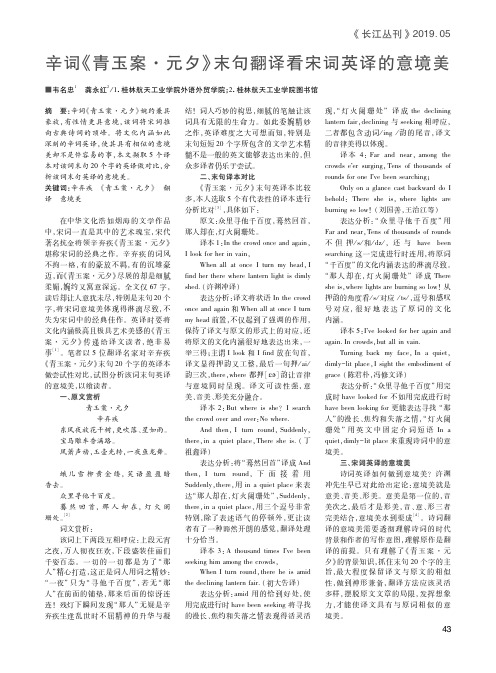
现,“灯 火 阑 珊 处 ” 译 成 thedeclining lanternfair,declining与 seeking相呼应, 二者都包 含 动 词 /ing/韵 的 尾 音,译 文 的音律美得以体现。
译 本 4:Farand near,among the crowdseersurging,Tensofthousandsof roundsforoneIvebeensearching;
在中华 文 化 浩 如 烟 海 的 文 学 作 品 中,宋词一直是其中的艺术瑰宝,宋 代 著名抗金 将 领 辛 弃 疾 《青 玉 案 · 元 夕 》 堪称宋 词 的 经 典 之 作。辛 弃 疾 的 词 风 不拘一格,有的豪放不羁,有的沉 雄 豪 迈,而《青玉案·元夕》尽展的却是细腻 柔媚,婉约又寓意深远。全文仅 67字, 读后却让人意犹未尽,特别是末句 20个 字,将宋词意境美体现得淋漓尽 致,不 失为宋 词 中 的 经 典 佳 作。英 译 时 要 将 文化内涵极高且极具艺术美感的《青玉 案 · 元 夕》传 递 给 译 文 读 者,绝 非 易 事[1]。笔者以 5位 翻 译 名 家 对 辛 弃 疾 《青玉案·元夕》末句 20个字的英译本 做尝试性对比,试图分析该词末句英译 的意境美,以飨读者。
OnlyonaglancecastbackwarddoI behold:There she is,where lightsare burningsolow!(刘国善,王治江等)
表达分 析:“众 里 寻 他 千 百 度”用 Farandnear,Tensofthousandsofrounds 不 但 押 /s/和 /dz/,还 与 have been searc却 在,灯 火 阑 珊 处”译 成 There sheis,wherelightsareburningsolow!从 押韵的角度看 /s/对应 /ts/,逗号和感叹 号 对 应,很 好 地 表 达 了 原 词 的 文 化 内涵。
辛弃疾《青玉案·元夕》英译策略体系四维研究

辛弃疾《青玉案·元夕》英译策略体系四维研究【摘要】In this study, we explore the English translation strategies of the famous Chinese poet Xin Qiji's poem "Lament of the Green Jade Case on New Year's Eve" from four dimensions.Lastly, we present our research findings, discuss the implications of our study, and outline potential directions for future research in the field of Chinese poetry translation. This study contributes to a deeper understanding of the complex process of translating Chinese poetry and sheds light on the challenges and opportunities in this field.【关键词】辛弃疾, 青玉案·元夕, 英译策略, 体系建构, 四维实证研究, 文本分析, 研究背景, 研究意义, 研究成果, 展望未来, 思考与启示1. 引言1.1 研究背景辛弃疾是中国北宋时期著名的文学家和诗人,他的诗作在中国文学史上具有重要地位。
《青玉案·元夕》是辛弃疾的代表作之一,通过对元宵节的描写,表达了诗人对家乡和亲人的思念之情。
这首诗以其优美的语言和深邃的情感,深受读者喜爱。
研究《青玉案·元夕》的英译策略体系是为了更好地传播中国文学的精髓,让更多的人了解和欣赏辛弃疾的诗歌。
中英双语古诗词:生查子.元夕
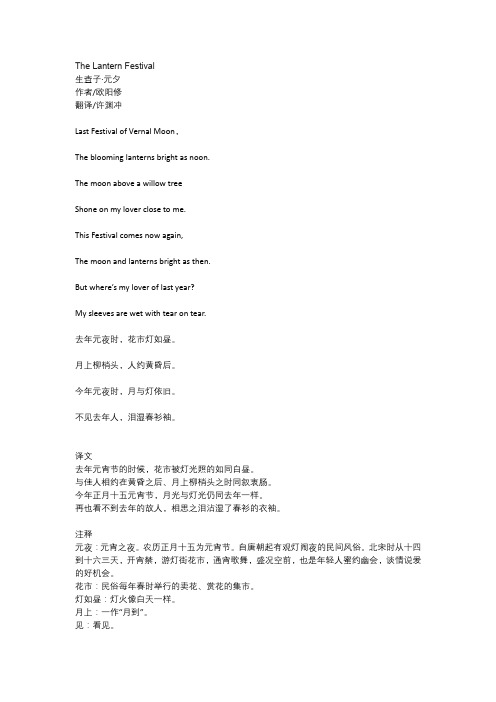
The Lantern Festival
生查子·元夕
作者/欧阳修
翻译/许渊冲
Last Festival of Vernal Moon,
The blooming lanterns bright as noon.
The moon above a willow tree
Shone on my lover close to me.
This Festival comes now again,
The moon and lanterns bright as then.
But where’s my lover of last year?
My sleeves are wet with tear on tear.
去年元夜时,花市灯如昼。
月上柳梢头,人约黄昏后。
今年元夜时,月与灯依旧。
不见去年人,泪湿春衫袖。
译文
去年元宵节的时候,花市被灯光照的如同白昼。
与佳人相约在黄昏之后、月上柳梢头之时同叙衷肠。
今年正月十五元宵节,月光与灯光仍同去年一样。
再也看不到去年的故人,相思之泪沾湿了春衫的衣袖。
注释
元夜:元宵之夜。
农历正月十五为元宵节。
自唐朝起有观灯闹夜的民间风俗。
北宋时从十四到十六三天,开宵禁,游灯街花市,通宵歌舞,盛况空前,也是年轻人蜜约幽会,谈情说爱的好机会。
花市:民俗每年春时举行的卖花、赏花的集市。
灯如昼:灯火像白天一样。
月上:一作“月到”。
见:看见。
泪湿:一作“泪满”。
春衫:年少时穿的衣服,也指代年轻时的自己。
青玉案元夕译文及赏析

青玉案元夕译文及赏析青玉案,又称《元夕》,是唐代文学家张祜创作的一首五言绝句诗。
这首诗以元宵节为题材,通过描写女主角容貌的美丽和诗人对她的情感表达,展现了元宵节的喜庆和浪漫氛围。
以下是对青玉案元夕诗的一种翻译及赏析。
淡妆浓抹总相宜当时只道是寻常如今却恍如隔世花非花,雾非雾夜半钟声到客船望穿秋水一人眠沿着青玉案偷瞥羞看满地鸳鸯瓦翩翩宫扇曳风羞册封肯误黄粱美既是相期又相忘如何不羡青如玉青玉案元夕译文:淡妆浓抹总相宜,当时只以为寻常。
如今却恍如隔世,花不是花,雾不是雾。
夜半钟声到客船,望穿秋水一人眠。
沿着青玉案偷瞥,羞看满地鸳鸯瓦。
翩翩宫扇抚风羞,身份尊贵怎么会错过那美呢。
既是有约定又已经忘记,如何能不羡慕玉石一般的美。
青玉案元夕赏析:《青玉案元夕》是一首描写元宵节的五言绝句诗,作者以简洁而富有意境的笔触,表达了元宵节的喜庆氛围以及男女之间的爱情与思念。
首句“淡妆浓抹总相宜”,以淡妆浓抹相互对比来形容女主角的美丽,同时表达了她与元宵节的和谐共生。
接着,诗句“当时只以为寻常”,用洞察人心的眼光,展示了主人公对美女的初级愉悦。
在第三句“如今却恍如隔世,花不是花,雾不是雾”中,作者通过对时间流逝的描绘,暗示主人公与女主角的关系发生了变化,让人感受到岁月流转和人事易逝的无常。
第四句“夜半钟声到客船,望穿秋水一人眠”,在暗示主人公的独自失眠,同时也凸显出元宵节的幽静与宁神。
与此同时,第五句“沿着青玉案偷瞥,羞看满地鸳鸯瓦”,则将主人公和女主角的关系继续升温,表现出男主人公对女主角的痴迷和爱慕之情。
最后两句“翩翩宫扇抚风羞,身份尊贵怎么会错过那美呢。
既是有约定又已经忘记,如何能不羡慕玉石一般的美”,通过描述男主人公的内心独白,展示了他对女主角美丽和高贵身份的赞叹、感叹和羡慕。
整首诗通过流畅的语言,唤起读者对元宵节的回忆和情感,同时表达了青年男子对美丽女性的追求和爱慕之情。
通过婉约流畅的句式和具体形象的描绘,使诗歌活灵活现,富有画面感,使读者产生共鸣和思考。
关于元宵的英文翻译

关于元宵的英文翻译“上元”,“元夕”,指的都是“元宵节”。
辛弃疾的这首《青玉案》,描绘了在元夕灯火中等寻情人的情景,是稼轩词中为数很少的涉及爱情的作品之一。
你知道元宵的英文翻译,怎么翻译吗?有关元宵节的英语~猜你就不知道~元宵节快乐元宵节英语之元宵习俗根据道教所言,农历正月的第15天又称“上元”“,英文为“Official of Heaven”,所以元宵节(Lantern Festival)又称“上元节”。
团圆饭(reunion dinner)猜灯谜(guess lantern riddles)观花灯(watch lantern)放烟花(set off fireworks)……可惜的是很多古人有趣的习俗,都随着时间的推移渐渐被人遗忘了,这些被人遗忘的元宵传统,你想知道吗?约会 Finding loveSome have dug into the festival’ s origin and found that it was truly a romantic day as ancient Chinese girls grew up at home and hardly had chance to go outside to meet people. But the Lantern Festival was an exception. On that particular day, young women were allowed to go outdoors at night to see the lantern displays, offering them an opportunity to meet young men.有人深扒元宵节的渊源发现,在古代中国这真是一个浪漫的节日:中国古代深闺之中的女孩很难外出见人。
但是元宵节是个例外。
在那天,年轻女子被允许晚上外出逛夜会,并有机会和男孩约会。
青玉案·元夕情人节的由来
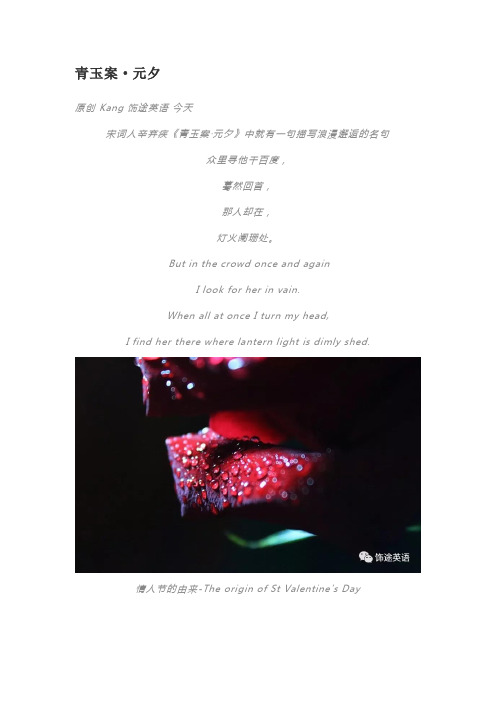
青玉案·元夕原创 Kang 饰途英语今天宋词人辛弃疾《青玉案·元夕》中就有一句描写浪漫邂逅的名句众里寻他千百度,蓦然回首,那人却在,灯火阑珊处。
But in the crowd once and againI look for her in vain.When all at once I turn my head,I find her there where lantern light is dimly shed.情人节的由来-The origin of St Valentine's DaySt. Valentine's Day has roots in several different legends that have found their way to us through the ages. One of the earliest popular symbols of the day is Cupid(爱神丘比特)the Roman god of love who is represented by the image of a young boy with bow and arrow. Three hundred years after the death of Jesus Christ the Roman emperors still demanded that everyone believe in the Roman gods. Valentine a Christian priest had been thrown in prison for his teachings. On February 14 Valentine was beheaded(斩首)not only because he was a Christian but also because he had performed a miracle. He supposedly cured the jailer's daughter of her blindness. The night before he was executed he wrote the jailer's daughter a farewell letter signing it 'From Your Valentine.'小补充日本:在情人节(2月14日),男性不送任何礼物。
元宵节的诗句英语翻译

元宵节的诗句英语翻译The Lantern Festival poem1、生查子欧阳修去年元夜时,花市灯如昼。
月上柳梢头,人约黄昏后。
今年元夜时,月与灯依旧。
不见去年人,泪湿春衫袖。
1. Examine children Ouyang Xiu Last year, the night, the flower market lights as day. On the moon, the willow tip head, people about after dusk. This year yuan night, the moon and the lights are still. Not see last year, tears wet spring shirt sleeve.2、《观灯乐行》【唐】李商隐月色灯山满帝都,香车宝盖隘通衢。
身闲不睹中兴盛,羞逐乡人赛紫姑。
2. Fun Shin for Watching the Lantern p [Tang] Li Shangyin Moonlight mountain mountain the capital, Xiangcar bao gai pass thoroughfare. In idle prosperity, Shy chase thevillagers race purple gu.3、元宵唐寅有灯无月不娱人,有月无灯不算春。
春到人间人似玉,灯烧月下月如银。
满街珠翠游村女,沸地笙歌寒社神。
不展芳尊开口笑,如何消得此良辰。
3.Yuanxiao Tang Yin A light no month not entertainment, a month without light is not spring. Spring to the earth like jade, lamp burning the next month such as silver. Full street bead cui you village female, boiling ground sheng song cold society god. Do not show fang zun open mouth smile, how to eliminate this hour.。
《中国传统节日诗句及英文翻译》

《中国传统节日诗句及英文翻译》编辑:理想谭一、春节(Spring Festival)“爆竹声中一岁除,春风送暖入屠苏。
”——王安石《元日》“As the crackers roar, a year passes away; The spring wind brings warmth and makes Tu Su fragrant.”“千门万户曈曈日,总把新桃换旧符。
”——王安石《元日》“On every household's door, the sun shines brightly; Always replacing old talismans with new ones.”“昨夜斗回北,今朝岁起东。
”——孟浩然《田家元日》“Last night, the Dipper pointed north; This morning, a new year begins in the east.”“我年已强壮,无禄尚忧农。
桑野就耕父,荷锄随牧童。
”——孟浩然《田家元日》“I am already strong and in my prime. Without official salary, I still worry about farming. In the mulberry fields, I work with farmers, Carrying a hoe and following shepherd boys.”“不求见面惟通谒,名纸朝来满敝庐。
”——文征明《拜年》“Not seeking face-to-face meetings but only sending greetings. In the morning, visiting cards fill my humble abode.”二、元宵节(Lantern Festival)“月到柳梢头,人约黄昏后。
”——欧阳修《生查子·元夕》“When the moon rises above the willow tops, People make an appointment after dusk.”“众里寻他千百度,蓦然回首,那人却在,灯火阑珊处。
心灵的共鸣辛弃疾青玉案元夕译文及赏析
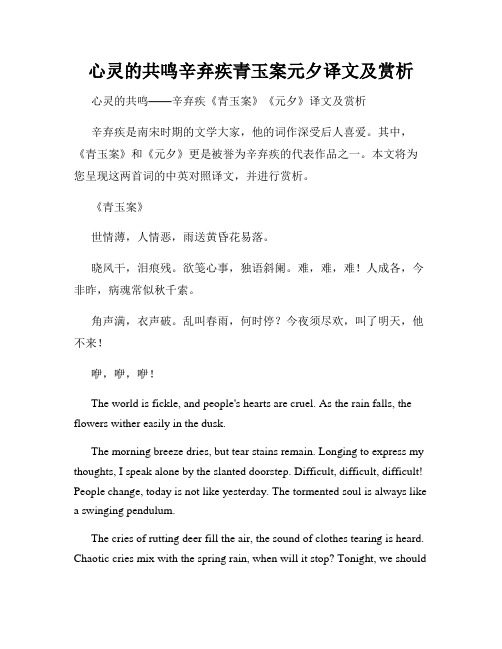
心灵的共鸣辛弃疾青玉案元夕译文及赏析心灵的共鸣——辛弃疾《青玉案》《元夕》译文及赏析辛弃疾是南宋时期的文学大家,他的词作深受后人喜爱。
其中,《青玉案》和《元夕》更是被誉为辛弃疾的代表作品之一。
本文将为您呈现这两首词的中英对照译文,并进行赏析。
《青玉案》世情薄,人情恶,雨送黄昏花易落。
晓风干,泪痕残。
欲笺心事,独语斜阑。
难,难,难!人成各,今非昨,病魂常似秋千索。
角声满,衣声破。
乱叫春雨,何时停?今夜须尽欢,叫了明天,他不来!咿,咿,咿!The world is fickle, and people's hearts are cruel. As the rain falls, the flowers wither easily in the dusk.The morning breeze dries, but tear stains remain. Longing to express my thoughts, I speak alone by the slanted doorstep. Difficult, difficult, difficult! People change, today is not like yesterday. The tormented soul is always like a swinging pendulum.The cries of rutting deer fill the air, the sound of clothes tearing is heard. Chaotic cries mix with the spring rain, when will it stop? Tonight, we shouldrevel to our hearts' content, and call out for tomorrow. But tomorrow, he won't come!Yi, yi, yi!辛弃疾的《青玉案》描绘了一个失恋者的心情,通过描写雨夜中的凄凉景象,表达了作者对爱情、人世间的无奈与悲凉之情。
从《青玉案·元夕》两英译本看社会符号学意义的翻译
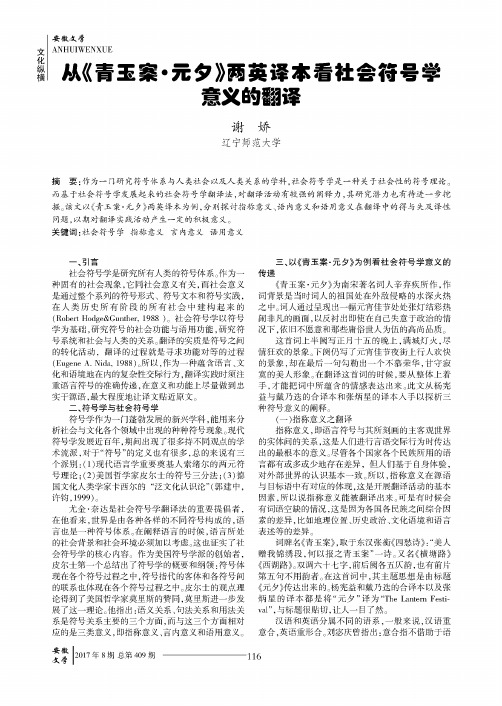
纵从《青玉案•元夕》两英译本看社会符号学意义的翻译谢娇辽宁师范大学妥徽文学文 ANHUIWENXUE化摘要:作为一门研究符号体系与人类社会以及人类关系的学科,社会符号学是一种关于社会性的符号理论。
而基于社会符号学发展起来的社会符号学翻译法,对翻译活动有较强的阐释力,其研究潜力也有待进一步挖 掘。
该文以《青玉案.元夕》两英译本为例,分别探讨指称意义、语内意义和语用意义在翻译中的得与失及译性 问题,以期对翻译实践活动产生一定的积极意义。
关键词:社会符号学指称意义言内意义语用意义-'引言社会符号学是研究所有人类的符号体系。
作为一 种固有的社会现象,它同社会意义有关,而社会意义 是通过整个系列的符号形式、符号文本和符号实践, 在人类历史所有阶段的所有社会中建构起来的 (RobertHoclge &Gunther,1988冤。
社会符号学以符号学为基础,研究符号的社会功能与语用功能,研究符 号系统和社会与人类的关系。
翻译的实质是符号之间 的转化活动,翻译的过程就是寻求功能对等的过程(EugeneA .Nida,1988)。
所以,作为一种蕴含语言、文化和语境地在内的复杂性交际行为,翻译实践时须注 重语言符号的准确传递,在意义和功能上尽量做到忠 实于源语,最大程度地让译文贴近原文。
二、符号学与社会符号学符号学作为一门蓬勃发展的新兴学科,能用来分 析社会与文化各个领域中出现的种种符号现象。
现代 符号学发展近百年,期间出现了很多持不同观点的学 术流派,对于“符号”的定义也有很多,总的来说有三 个派别院(1)现代语言学重要奠基人索绪尔的两元符 号理论;(2)美国哲学家皮尔士的符号三分法;(3)德 国文化人类学家卡西尔的“泛文化认识论冶(郭建中, 许钧,1999)。
尤金•奈达是社会符号学翻译法的重要提倡者, 在他看来,世界是由各种各样的不同符号构成的,语 言也是一种符号体系。
在阐释语言的时候,语言所处 的社会背景和社会环境必须加以考虑。
青玉案·元夕诗歌鉴赏作文800字
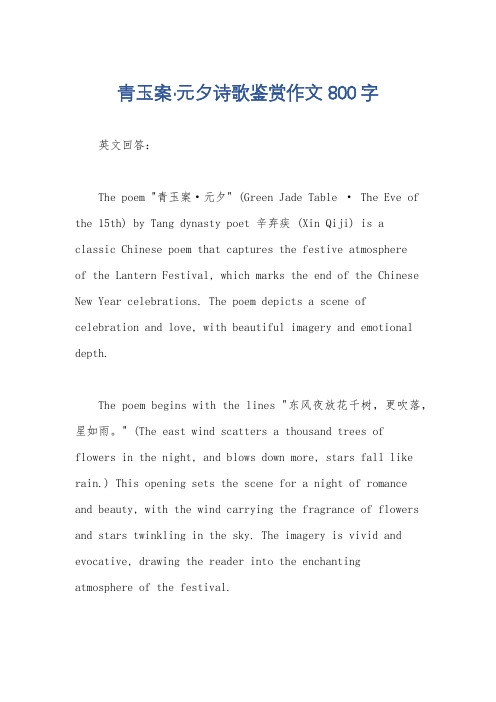
青玉案·元夕诗歌鉴赏作文800字英文回答:The poem "青玉案·元夕" (Green Jade Table · The Eve of the 15th) by Tang dynasty poet 辛弃疾 (Xin Qiji) is aclassic Chinese poem that captures the festive atmosphereof the Lantern Festival, which marks the end of the Chinese New Year celebrations. The poem depicts a scene of celebration and love, with beautiful imagery and emotional depth.The poem begins with the lines "东风夜放花千树,更吹落,星如雨。
" (The east wind scatters a thousand trees offlowers in the night, and blows down more, stars fall like rain.) This opening sets the scene for a night of romance and beauty, with the wind carrying the fragrance of flowers and stars twinkling in the sky. The imagery is vivid and evocative, drawing the reader into the enchanting atmosphere of the festival.As the poem progresses, it describes the joyous celebrations of the Lantern Festival, with people enjoying the sight of lanterns, singing and dancing, and expressing their love and longing. The poet's use of language is rich and expressive, conveying the warmth and excitement of the festive occasion. The poem also expresses a sense of nostalgia and longing, as the poet yearns for his loved one who is far away.The final lines of the poem are particularly poignant, as the poet laments the passing of time and the fleeting nature of happiness. He writes, "忽如一夜春风来,千树万树梨花开。
元宵古诗情话英文作文
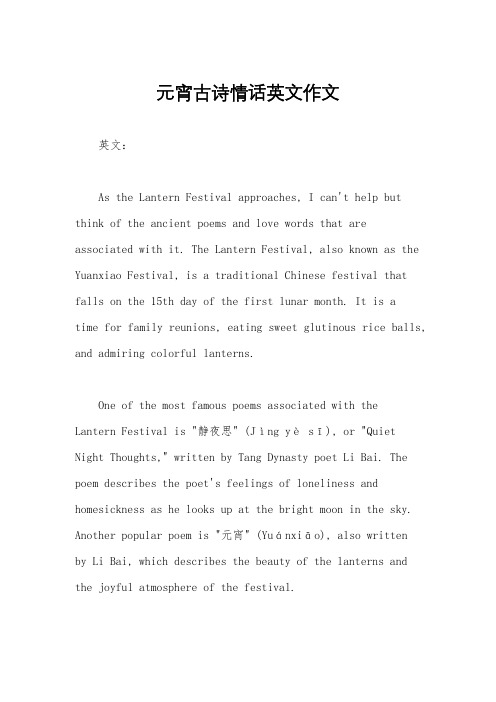
元宵古诗情话英文作文英文:As the Lantern Festival approaches, I can't help but think of the ancient poems and love words that are associated with it. The Lantern Festival, also known as the Yuanxiao Festival, is a traditional Chinese festival that falls on the 15th day of the first lunar month. It is atime for family reunions, eating sweet glutinous rice balls, and admiring colorful lanterns.One of the most famous poems associated with theLantern Festival is "静夜思" (Jìng yè sī), or "Quiet Night Thoughts," written by Tang Dynasty poet Li Bai. The poem describes the poet's feelings of loneliness and homesickness as he looks up at the bright moon in the sky. Another popular poem is "元宵" (Yuánxiāo), also writtenby Li Bai, which describes the beauty of the lanterns and the joyful atmosphere of the festival.When it comes to love words, there are many phrases and idioms that are associated with the Lantern Festival. Oneof the most famous is "花好月圆" (Huā hǎo yuè yuán), which means "flowers are beautiful and the moon is full." This phrase is often used to express good wishes for ahappy marriage or a successful relationship.Another popular phrase is "情人节" (Qíng rén jié), which means "Valentine's Day" in Chinese. Although the Lantern Festival is not traditionally associated with romantic love, many young couples use this day as an opportunity to express their love for each other.中文:随着元宵节的临近,我不禁想起与之相关的古诗情话。
青玉案·元夕600字作文鉴赏
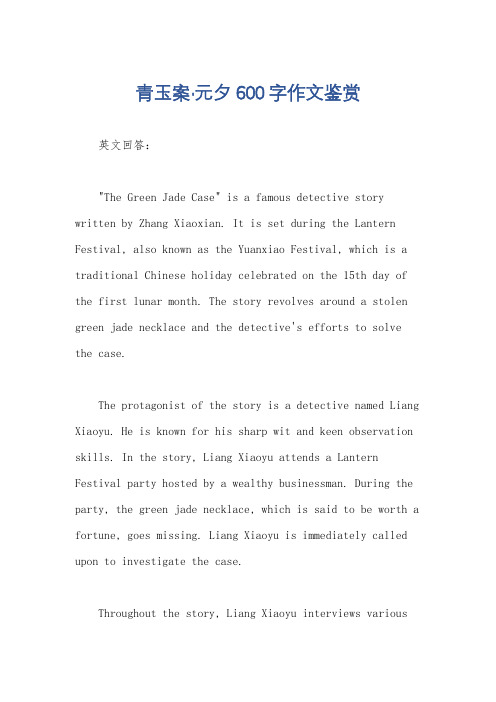
青玉案·元夕600字作文鉴赏英文回答:"The Green Jade Case" is a famous detective story written by Zhang Xiaoxian. It is set during the Lantern Festival, also known as the Yuanxiao Festival, which is a traditional Chinese holiday celebrated on the 15th day of the first lunar month. The story revolves around a stolen green jade necklace and the detective's efforts to solve the case.The protagonist of the story is a detective named Liang Xiaoyu. He is known for his sharp wit and keen observation skills. In the story, Liang Xiaoyu attends a Lantern Festival party hosted by a wealthy businessman. During the party, the green jade necklace, which is said to be worth a fortune, goes missing. Liang Xiaoyu is immediately called upon to investigate the case.Throughout the story, Liang Xiaoyu interviews varioussuspects and collects clues. He carefully examines the crime scene and uses his deductive reasoning to narrow down the list of possible culprits. He also relies on his knowledge of human nature and understanding of Chinese customs to uncover the truth.For example, Liang Xiaoyu notices that one of the suspects, a young woman, is wearing a dress that isslightly torn. He deduces that she might have been involved in a struggle during the theft. He also observes that another suspect, a middle-aged man, is sweating profusely despite the cool weather. This leads him to suspect that the man might be nervous and hiding something.In the end, Liang Xiaoyu solves the case and reveals the true thief. It turns out to be the wealthy businessman's own son, who stole the necklace to pay off his gambling debts. Liang Xiaoyu's sharp observation skills and understanding of human nature ultimately lead to the resolution of the case."The Green Jade Case" is not only a thrilling detectivestory, but it also provides insights into Chinese culture and customs. The story takes place during the Lantern Festival, a time when families gather to celebrate and enjoy lantern displays. It also highlights the importance of trust and loyalty within Chinese society, as the thief turns out to be someone close to the victim.中文回答:《青玉案·元夕》是张小娴所写的一部著名侦探小说。
元宵节古诗词《青玉案·元夕》英文翻译
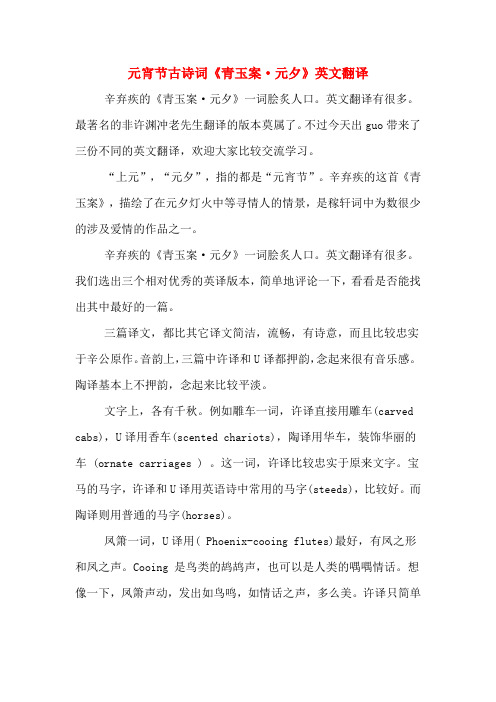
元宵节古诗词《青玉案·元夕》英文翻译辛弃疾的《青玉案·元夕》一词脍炙人口。
英文翻译有很多。
最著名的非许渊冲老先生翻译的版本莫属了。
不过今天出guo带来了三份不同的英文翻译,欢迎大家比较交流学习。
“上元”,“元夕”,指的都是“元宵节”。
辛弃疾的这首《青玉案》,描绘了在元夕灯火中等寻情人的情景,是稼轩词中为数很少的涉及爱情的作品之一。
辛弃疾的《青玉案·元夕》一词脍炙人口。
英文翻译有很多。
我们选出三个相对优秀的英译版本,简单地评论一下,看看是否能找出其中最好的一篇。
三篇译文,都比其它译文简洁,流畅,有诗意,而且比较忠实于辛公原作。
音韵上,三篇中许译和U译都押韵,念起来很有音乐感。
陶译基本上不押韵,念起来比较平淡。
文字上,各有千秋。
例如雕车一词,许译直接用雕车(carved cabs),U译用香车(scented chariots),陶译用华车,装饰华丽的车 (ornate carriages ) 。
这一词,许译比较忠实于原来文字。
宝马的马字,许译和U译用英语诗中常用的马字(steeds),比较好。
而陶译则用普通的马字(horses)。
凤箫一词,U译用( Phoenix-cooing flutes)最好,有凤之形和凤之声。
Cooing 是鸟类的鸪鸪声,也可以是人类的喁喁情话。
想像一下,凤箫声动,发出如鸟鸣,如情话之声,多么美。
许译只简单地用箫(flute)一字,没有译凤字。
陶译则用神奇的箫(magic flute)代替,也没有用凤字。
玉壶一词,U译和陶译都是译成玉壶 (jade pot, jade urn)。
比较符合原作之意。
许译成月亮,虽然有此一说,但是与原作之意不甚贴切。
因为据周密《武林旧事。
元夕》:“灯之品极多,。
福州所进,则纯用白玉,晃耀夺目,如清水玉壶。
”。
所以玉壶应该就是白玉雕饰的灯。
暗香一词,U译成浮香(fragrance floating),说出香的形态而没有说是微淡的香。
关于元宵节的古诗英语翻译
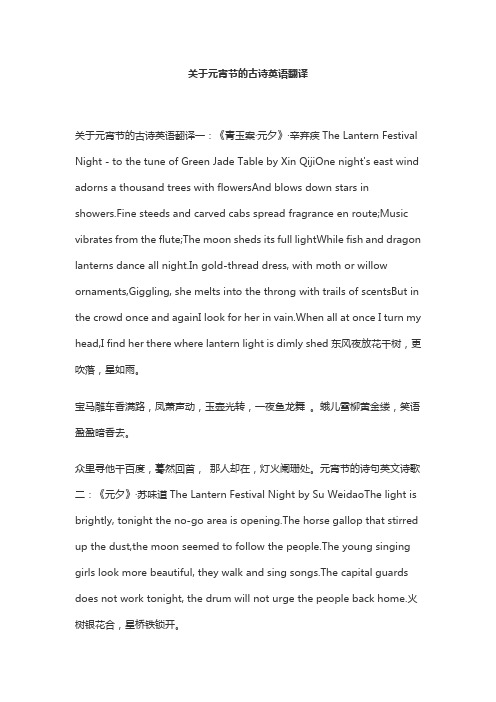
关于元宵节的古诗英语翻译关于元宵节的古诗英语翻译一:《青玉案·元夕》·辛弃疾The Lantern Festival Night - to the tune of Green Jade Table by Xin QijiOne night's east wind adorns a thousand trees with flowersAnd blows down stars in showers.Fine steeds and carved cabs spread fragrance en route;Music vibrates from the flute;The moon sheds its full lightWhile fish and dragon lanterns dance all night.In gold-thread dress, with moth or willow ornaments,Giggling, she melts into the throng with trails of scentsBut in the crowd once and againI look for her in vain.When all at once I turn my head,I find her there where lantern light is dimly shed东风夜放花千树,更吹落,星如雨。
宝马雕车香满路,凤萧声动,玉壶光转,一夜鱼龙舞。
蛾儿雪柳黄金缕,笑语盈盈暗香去。
众里寻他千百度,蓦然回首,那人却在,灯火阑珊处。
元宵节的诗句英文诗歌二:《元夕》·苏味道The Lantern Festival Night by Su WeidaoThe light is brightly, tonight the no-go area is opening.The horse gallop that stirred up the dust,the moon seemed to follow the people.The young singing girls look more beautiful, they walk and sing songs.The capital guards does not work tonight, the drum will not urge the people back home.火树银花合,星桥铁锁开。
《青玉案·元夕》中比喻的英译探究

《青玉案元夕》中比喻的英译探究潘丽妃;彭俊【摘要】From the perspective of the relevance theory-based study of translation,this paper adopts Tune:“Green Jade Cup” Lantern Festival by Xin Qiji,the famous poet in Song Dynasty,as a text of study. Based on English translations by Xu Yuanchong,Chu Dagao,and Xu Zhongjie, a comparative analysis is car-ried out on the translation methods of tropesin this work. After the comparison and analysis,the author of this paper proposes that to reach the goal of optimal relevance so that target readers can have access to the meaning of the texts more clearly andreadily,translators can choose to clearly state the noumena,or to add annotations when translating metaphors associated with huge cultural differences in poems where the noume-na are not clearly stated in the original.%文章以翻译理论家Ernst August Gutt提出的关联翻译理论作为理论基础,以宋词大家辛弃疾的《青玉案·元夕》的英译作为研究对象,选取了许渊冲、初大告和徐忠杰的英译本,对比分析了三个英译本对该词中比喻的英译方法,指出:为尽可能达到最佳关联性,使译文能更准确、更顺畅地被读者理解,针对诗词中原文未指明本体,却又涉及较大文化差异的比喻的翻译,译者可在译文中使用明示本体或者加注的方式来进行翻译,以降低译文受众理解译文的难度和避免可能出现的误读。
青玉案元夕解读

青玉案元夕解读(中英文实用版)Title: Interpretation of the Qingyu Case Spring Festival主题:青玉案元夕解读The Qingyu Case Spring Festival is an important traditional Chinese festival celebrated on the 15th day of the first lunar month.Also known as the Lantern Festival, it is a time for families to gather, enjoy delicious food, and appreciate the beauty of lanterns.青玉案元夕是中国传统节日之一,在农历正月十五庆祝。
也被称为元宵节,是家人团聚、品尝美食、欣赏灯笼之美的好时光。
One of the most significant customs of the Qingyu Case Spring Festival is eating sweet glutinous rice balls, known as "tangyuan" in Chinese.These round and smooth rice balls symbolize unity and harmony, as they are made from a mixture of sticky rice and water and are often filled with various fillings such as red bean paste, sesame, or lotus seed paste.元宵节最显著的习俗之一是吃甜糯米球,称为“汤圆”在中国。
这些圆滑的糯米球象征着团结和谐,由糯米和水混合制成,通常填充有红豆沙、芝麻或莲子蓉等不同馅料。
- 1、下载文档前请自行甄别文档内容的完整性,平台不提供额外的编辑、内容补充、找答案等附加服务。
- 2、"仅部分预览"的文档,不可在线预览部分如存在完整性等问题,可反馈申请退款(可完整预览的文档不适用该条件!)。
- 3、如文档侵犯您的权益,请联系客服反馈,我们会尽快为您处理(人工客服工作时间:9:00-18:30)。
Fleeting our scented chariots and stately steeds.
Phoenix-cooing flutes resounding,
Jade-pot-flashing lanterns revolving,
Dolphins and dragons are dancing away--
Giggling, she melts into the throng with trails of scents
But in the crowd once and again
I look for her in vain.
When all at once I turn my head,
(ornate carriages )
。这一词,许译比较忠实于原来文字。宝马的马字,许译和U译用英语诗中常用的马字(steeds),比较好。而陶译则用普通的马字(horses)。
凤箫一词,U译用( Phoenix-cooing flutes)最好,有凤之形和凤之声。Cooing
I find her there where lantern light is dimly shed.
(2)译者U君,简称U译
The east wind at night has flowered a thousand trees,
Bringing showers of glowing stars down streets,
辛弃疾的《青玉案·元夕》一词脍炙人口。英文翻译有很多。最著名的非许渊冲老先生翻译的版本莫属了。不过今天带来了三份不同的英文翻译,欢迎大家比较交流学习。
青玉案·元夕
(宋)辛弃疾
东风夜放花千树,更吹落,星如雨。
宝马雕车香满路,凤萧声动,壶光转,一夜鱼龙舞 。
蛾儿雪柳黄金缕,笑语盈盈暗香去。
Music vibrates from the flute;
The moon sheds its full light
While fish and dragon lanterns dance all night.
In gold-thread dress, with moth or willow ornaments,
三篇译文,都比其它译文简洁,流畅,有诗意,而且比较忠实于辛公原作。音韵上,三篇中许译和U译都押韵,念起来很有音乐感。陶译基本上不押韵,念起来比较平淡。
文字上,各有千秋。例如雕车一词,许译直接用雕车(carved cabs),U译用香车(scented chariots),陶译用华车,装饰华丽的车 众里寻他千,蓦然回首,那人却在,灯火阑珊处。
“上元”,“元夕”,指的都是“元宵节”。辛弃疾的这首《青玉案》,描绘了在元夕灯火中等寻情人的情景,是稼轩词中为数很少的涉及爱情的作品之一。
辛弃疾的《青玉案·元夕》一词脍炙人口。英文翻译有很多。我们选出三个相对优秀的英译版本,简单地评论一下,看看是否能找出其中最好的一篇。
是鸟类的鸪鸪声,也可以是人类的喁喁情话。想像一下,凤箫声动,发出如鸟鸣,如情话之声,多么美。许译只简单地用箫(flute)一字,没有译凤字。陶译则用神奇的箫(magic
flute)代替,也没有用凤字。
玉壶一词,U译和陶译都是译成玉壶 (jade pot, jade
urn)。比较符合原作之意。许译成月亮,虽然有此一说,但是与原作之意不甚贴切。因为据周密《武林旧事。元夕》:“灯之品极多,。。福州所进,则纯用白玉,晃耀夺目,如清水玉壶。。。”。所以玉壶应该就是白玉雕饰的灯。
One night's east wind adorns a thousand trees with howers.
Fine steeds and carved cabs spread fragrance en route;
暗香一词,U译成浮香(fragrance floating),说出香的形态而没有说是微淡的香。陶译成幽香(subtle perfume),
许译成缕香(trials of
scents)都很好。但是,如果根据林和靖咏梅诗:“疏影横斜水清浅,暗香浮动月黄昏。”则暗香的形态可以是浮动的。因此,如果U译加一字,改成暗香浮动(faint
Far and near, among the crowds surging,
由上可见,诗词的英文翻译要做到简洁,流畅,有韵律,有诗意,贴切,忠实于原作,并不容易。
元宵节诗词英译赏析:《青玉案·元夕》
The Lantern Festival Night - to the tune of Green Jade Table
by Xin Qiji
(1)许渊冲、许明译,简称许译
fragrance floating),就贴切了。
“暗香去”的去字,U译和陶译用过去(passing, gone)不及许译用融入(melts into)好。
“蓦然回首”一词中的蓦然,陶译比较简单,只用偶然(perchance )一字, U译用匆匆一瞥(only on a
glance),两者都未能表达出蓦然一词中有突然的意思。许译成突然(when all at once), 最贴切了。
All night long it's bright as day.
See the grain moths silvern, the tassels golden?
See the snow-clad willow twigs of the maidens
Passing with laughter gurgling, fragrance floating?
